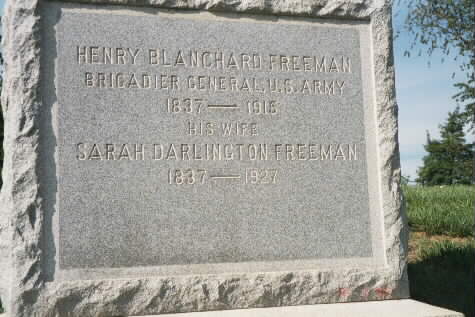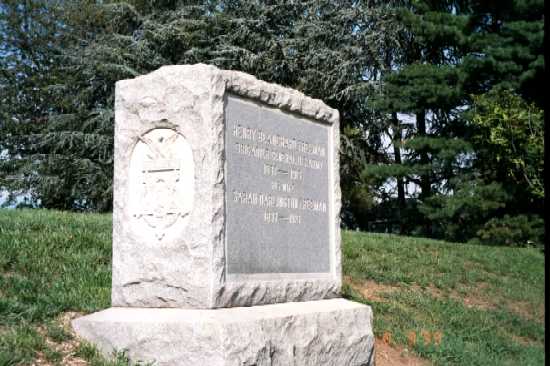Henry Blanchard Freeman of Ohio
Served in the Army as Private, Company G, 10th Infantry, 16 July 1855 to 5 February 1856
Private and First Sergeant, Company B, 2nd Battalion, 15th Infantry, 8 July to 4 November 1861
Second Lieutenant, 18th Infantry, 30 October 1861
First Lieutenant, 30 May 1862
Captain, 28 July 1866
Transferred to 27th Infantry, 21 September 1866
Unassigned, 14 June 1869
Assigned to 7th Infantry, 7 January 1870
Major, 16th Infantry, 19 June 1891
Lieutenant Colonel 5th Infantry, 30 January 1895
Colonel, 24th Infantry, 4 October 1898
Brigadier General, 16 January 1901
Brevetted Captain, 31 December 1862 for gallant and meritorious service in the battle of Murfeesboro, Tennessee
Brevetted Major, 30 September 1863 for gallant and meritorious service in the battle of Chickamauga, Georgia
Awarded Medal of Honor 17 February 1894 for distinguished gallantry in the battle of Stone River, 31 December 1862 voluntarily going to the front and picking up and carrying to a place of safety under a heavy fire from the advancing enemy and acting field officer who had been wounded and was about to fall into the enemy’s hands while serving as First Lieutenant, 18th Infantry
Retired 17 January 1901
Born at Vernon, Ohio, January 17, 1837, he served as Private, Company G, 10th United States Infantry, July 1, 1855-February 5, 1856, and was thereafter promoted through the grades to Colonel, 24th U.S. Infantry, October 4, 1898; and to Brigadier General, U.S. Army, January 16, 1901. He was retired by operation of law, January 17, 1901.
He was Brevetted Captain, December 31, 1862 for “gallant and meritorious services in the battle of Murfreesboro, Tennessee;” Brevetted Major, September 20, 1863, for same at the battle of Chickamauga, Georgia; he was awarded the Medal of Honor on February 17, 1894 for “distinguished gallantry in the battle of Stone River” during the Civil War. He was taken prisoner at Chickamauga and escaped from Libby Prison in Richmond, was re-captured and again escaped.
He was acting Adjutant General, 17th Corps and served on the Western Frontier during the Sioux War, 1867-68, at Powder River and at Fort Phil Kearny in the Cheyenne War in Kansas, 1868-69; in the Sioux War in 1873; in the Ute War in Colorado and then served in Cuba and in the Philippines during the Insurrection there.
He died at Douglas, Wyoming, on October 16, 1915 and was buried in Section 2 of Arlington National Cemetery. His wife, Sarah Darlington Freeman (1837-1927), is buried with him.
Henry Blanchard Freeman, born 17 January 1837 in Knox Ohio, enlisted in the 10th Infantry 16 July 1855. Appointed Lieutenant in May 1862, he was brevetted Captain in December for gallantry in the Battle of Murfreesboro, Tenn., and brevetted Major in September 1863 for gallantry in the Battle of Chickamauga, Ga.; received the Medal of Honor for extraordinary heroism in the Battle of Stone’s River 31 December 1862. After the close of the Civil War much of his remaining career was spent on Indian frontiers and reservations in Wyoming, Ohio, Colorado Utah, and Oklahoma. Promoted to Brigadier General in 1901, he received the Indian Campaign Medal. General Freeman died 16 December 1915, at Douglas, Wyoming.
FREEMAN, HENRY B.
Rank and organization: First Lieutenant, 18th U.S. Infantry. Place and date: At Stone River, Tennessee., 31 December 1862. Entered service at: Mount Vernon, Ohio. Birth: Mount Vernon, Ohio. Date of issue: 17 February 1894.
Citation:
Voluntarily went to the front and picked up and carried to a place of safety, under a heavy fire from the enemy, an acting field officer who had been wounded, and was about to fall into enemy hands.
GENERAL FREEMAN DEAD; FOUGHT WITH CUSTER
Veteran of Civil, Indian and Spanish Wars Died in Wyoming at 79
Congress Honored Him
His Indian Services Began in Sioux War of 1867-8
Last Served in Cuba and Philippines
DOUGLAS, Wyoming, October 16, 1915 – Brigadier General Henry Blanchard Freeman, who rose from the ranks and served fifty-one years in the United States Army, died here today in his eightieth year. He served with distinction during both the Indian and Civil Wars, and was one of the party of prisoners who tunneled out of Libby Prison. His funeral will be held in Washington, D.C.
General Freeman was born in Mount Vernon, Ohio, and enlisted in the Eighteenth Infantry at the age of eighteen. At the outbreak of the Civil War he was a First Sergeant in the Eighteenth Infantry, being promoted to a Second Lieutenancy a few months later. In 1866 he reached the grade of Captain, and in 1898, at the outbreak of the Spanish-American War, was Colonel of the Twenty-fourth Infantry. On January 16, 1901, he was promoted to be a Brigadier General, and was retired the next day under the age law.
General Freeman was twice brevet; once as a Captain for “gallant and meritorious services at the battle of Murfreesboro, Tennessee,” and lastly as Major for the same in the battle of Chickamauga, where he was taken prisoner and sent to Libby Prison. After his escape from this prison he was again captured and again escaped.
In 1894 he received the Congressional Medal of Honor “for distinguished gallantry in the battle of Stone River.”
General Freeman’s Indian services commenced in the Sioux War of 1867-8, when he was detailed to the frontier and took part in several campaigns. During the Cheyenne Indian war he served at Powder River at Fort Phil Kearny. During 1869-9 General Freeman took part in the campaign which resulted in the death of General Custer. Finally in 1879, he assisted in subduing the Ute Indians in Colorado. His last active service was in Cuba and the Philippine Islands.
General Freeman married Miss Sarah E. Darlington of Zanesville, Ohio, in 1866.
FREEMAN, HENRY B
BRIG GEN USA RETD
DATE OF DEATH: 10/16/1915
BURIED AT: SECTION E.D W SITE 937
ARLINGTON NATIONAL CEMETERY
FREEMAN, SARAH A WIDOW OF H B
DATE OF DEATH: 11/13/1927
BURIED AT: SECTION E E SITE LOT 937
ARLINGTON NATIONAL CEMETERY
Michael Robert Patterson was born in Arlington and is the son of a former officer of the US Army. So it was no wonder that sooner or later his interests drew him to American history and especially to American military history. Many of his articles can be found on renowned portals like the New York Times, Washingtonpost or Wikipedia.
Reviewed by: Michael Howard


